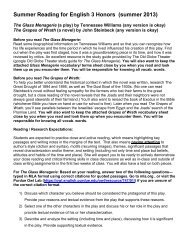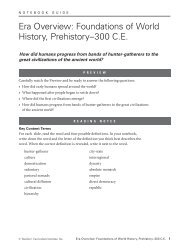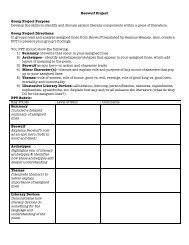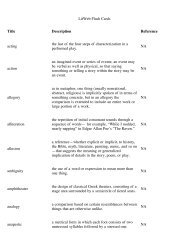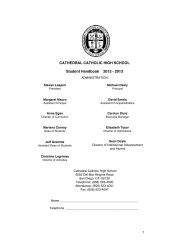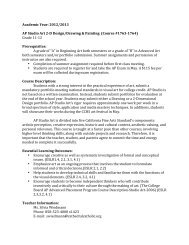DAISY MILLER HONORS ENGLISH Please read through these ...
DAISY MILLER HONORS ENGLISH Please read through these ...
DAISY MILLER HONORS ENGLISH Please read through these ...
Create successful ePaper yourself
Turn your PDF publications into a flip-book with our unique Google optimized e-Paper software.
of his works provide biting satires of would-be reformers. "Daisy Miller" may be seen as an early<br />
example of the "new woman" genre; and its heroine's death as an authorial "punishment" on the<br />
woman who oversteps familiar bounds, even if she remains technically "innocent."<br />
Many of James's novels explore the ideals, illusions, and failures of manners and morals, which lay<br />
behind confident exteriors. His observers are usually slightly detached, and often preoccupied with<br />
"the American personality," but also removed from it. Aspects of the pattern of "Daisy Miller" are<br />
sometimes repeated--an innocent narrator or character meets Europeans whose slightly sinister<br />
sophistication and guile is too much for the bumptuous (The American), trusting (The Golden Bowl),<br />
or naïve/inexperienced (The Ambassadors) protagonist/observer. The device of using a narrator<br />
who is neither entirely American nor entirely European enables James's narrator to criticize<br />
several cultures from a seemingly neutral position. Sexuality and love are viewed <strong>through</strong> a veil of<br />
innuendo and scepticism. Much of the plot interest turns on the narrator's effort at understanding<br />
the puzzle of others's lives, determining the degree to which the characters understand their own<br />
fate, and deciding on the extent to which he (always he) should mete out or withhold judgment on<br />
them, and less often, on himself. His characters are cultured, comfortably off, and free to devote<br />
their lives to affairs of the emotions or heart, and they often use this leisure for unwise or<br />
disappointing ends.<br />
1. What forms of pride might this story have evoked in American <strong>read</strong>ers of James's time? What<br />
anxieties about the nature of their own society might it have evoked?<br />
2. To which aspects of the plot and characterization do you think James's British <strong>read</strong>ers might<br />
have responded favorably?<br />
3. What are the implications of the story's subtitle, "A Study"? Of the names "Winterbourne"<br />
and "Daisy"?<br />
4. To what degree do you think the character of Daisy Miller might have embodied traits of a<br />
wealthy American girl of her day? Are there unrealistic or uncharacteristic aspects of her<br />
character, and if so, do <strong>these</strong> matter?<br />
5. What does the story mean by "innocence"? Why is Daisy Miller's relative "innocence" of<br />
importance to all who meet her?<br />
6. To what extent is this story organized around stereotypes? Are <strong>these</strong> stereotypes still<br />
current? Would they have bothered <strong>read</strong>ers of the time?<br />
7. What themes does this story share in common with those by Irving, Hawthorne and Melville we<br />
have <strong>read</strong>? What are some major contrasts?<br />
8. To what extent is the plot determined by the fact that the title character is a young,<br />
attractive woman? Would the attitudes conveyed by Winterbourne have been relatively tolerant,<br />
restrictive, or typical for his day? How did contemporary novels treat themes of pre-marital sex<br />
and adultery?<br />
9. What effect is created by opening the story in a Swiss hotel frequented by expatriates? Do<br />
some aspects of the opening description predispose the <strong>read</strong>er to expect some of what follows?<br />
10. What do we learn about the narrator in the opening sections--and what don't we learn? How is<br />
his "character" useful in permitting the unwinding of the plot?<br />
11. How would you characterize James's style? His descriptions? What are some instances of irony<br />
in his descriptions? (e. g., Winterbourne's response to Randolph's description of his father, the<br />
constant references to Schenectady)




